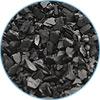 Coconuts are one of the more distinctive nuts found on Earth and an emblem of the tropics. The mere mention of them is enough to conjure up images of coconut palm fronds fluttering over white sand beaches with a deep blue tropical ocean stretching to the horizon. Coconuts are a source of white flesh tasty enough to be used as candy filling, and various oils, waters, and “milks” that may have therapeutic benefits. Today, however, they have yet another role to fulfill in the world – supplying carbon for high-quality water filters.
Coconuts are one of the more distinctive nuts found on Earth and an emblem of the tropics. The mere mention of them is enough to conjure up images of coconut palm fronds fluttering over white sand beaches with a deep blue tropical ocean stretching to the horizon. Coconuts are a source of white flesh tasty enough to be used as candy filling, and various oils, waters, and “milks” that may have therapeutic benefits. Today, however, they have yet another role to fulfill in the world – supplying carbon for high-quality water filters.
Carbon of various kinds has been used in water filters, and other types of filters, for a long time, because it is a substance well adapted to absorbing large amounts of contaminants. Carbon is highly absorbent in its own right, but its structure also helps make it a better filtration medium. Each piece of carbon is riddled with passages and pores, even more so than the proverbial Swiss cheese, which increases its surface area hugely.
The bigger the surface area of a filtration medium, the more pollutants it can absorb from a given amount of water in contact with it at any one time. Since water can flow into the pores of carbon and pollutants are therefore exposed to the much more absorbent surface, carbon removes hazardous substances quickly and effectively from our drinking water supply.
Activated coconut shell carbon
Coconut shell is burned to make carbon for water filters due to several properties that it has. These properties make it superior to carbon derived from most other sources known at this time. Some of the traits that put coconut shell carbon ahead of the pack include:
- Hardness. Coconut shell carbon is very hard, meaning that it lasts for a long time with pressurized water flowing through it, and filter cartridges using it need to be replaced much less frequently than those using other carbons.
- Lack of dust. Coconut shell carbon isn't dusty, meaning that it does not introduce particulate matter into the water stream.
- Taste. Water filtered through coconut shell carbon does not pick up any unpleasant tastes from the media, and has a characteristically clean, fresh taste.
- Effectiveness. Coconut shell carbon includes many micropores that are good for absorbing dangerous volatile organic compounds (VOCs) and other chemicals.
Up until recently, coconut shells were burned in open pits to produce carbon. This led to many greenhouse gases being released and made additional processing necessary since sand and grit needed to be removed from the carbon. Now, however, a “coconut reactor” has been developed which traps the greenhouse gases and burns them at a high enough temperature to reduce the CO2 to harmless component molecules. Energy is generated at the same time, making the reactor that much more efficient.
Coconut shell carbon is one of the most effective water filtration media and is now in the process of becoming more ecologically sound through the use of futuristic, reactor-based carbonizing processes. Thus the tale of the world's largest nut continues to expand into the space and environmental age as one of humanity's valuable resources.


Share:
Water Filters to Remove Giardia
Seychelle water filters to Avoid Contaminated Water